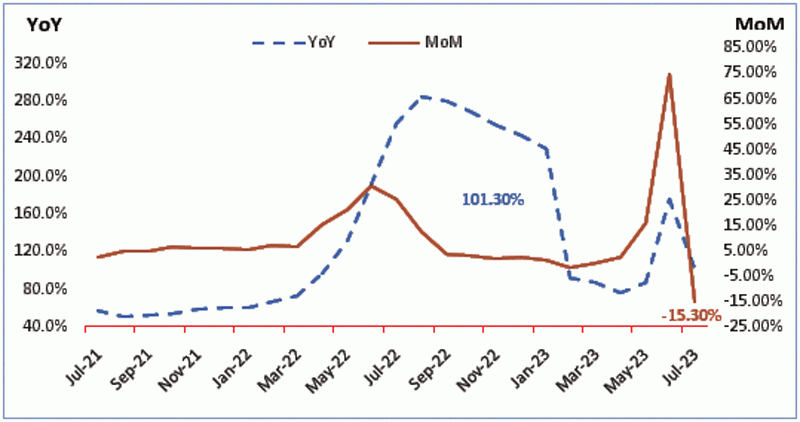
A FORTNIGHT ago, the Zimbabwe National Statistics Agency (ZimStat) released the July 2023 inflation statistics. Annual inflation was reported at 101.3% from 175.8% reported in June 2023. This means that general prices in the economy have increased by 101.3% between July 2022 and July 2023.Alternatively, the metrics indicate that consumer purchasing power has declined by more than 100% over the last year ending July 2023.
In monthly terms, the latest statistics show that Zimbabwe has moved from hyperinflation in June 2023 to deflation (negative inflation) in July 2023 as month-on-month price growth plunged from 74.5% to -15.3%. Since February 2023, ZimStat is reporting blended inflation which is the combined average change in prices of goods and services in USD and ZWLs.
The significant deceleration of inflation is largely attributable to ZWL stability experienced in both the official and parallel markets in July 2023 relative to the previous month. In June 2023, ZWL prices were out of control as the local unit erased over 55% of its value against the USD in parallel markets while USD prices in formal shops upscaled to comply with official exchange rate regulations.
The incessant instability forced authorities to intervene by instituting a cocktail of economic stability measures including finetuning the foreign currency auction system & interbank market to improve ZWL price discovery and demanding 50% of quarterly corporate tax payments to be settled in ZWLs.
The Treasury has also paused fulfilling its obligations like payments to contractors and suppliers. Largely due to these actions, the performance of the ZWL has changed positively. Since the start of July 2023 to date, the ZWL had regained at least 30% of its value against the USD in the official market while sailing stable in the alternative markets. If July 2023 stability of the local currency in the market is sustained, ZWL price inflation will likely continue to decline for months ahead.
However, authorities must ditch solely reporting blended inflation statistics as this has a bearing on both the market’s confidence in the ZWL and the public’s trust in government policies.
The blended metrics are mostly misleading because the dominance of the stable USD in calculating the weighted average exerts a stabilising effect thereby masking the actual inflation burden borne by the poor majority who are largely earning in fragile ZWLs.
Given the obtaining realities in the market, for example, it is unconvincing to posit that Zimbabwe experienced deflation of a significant magnitude in July 2023. Despite the firming of the local currency in the official markets in the month, ZWL shelf prices of most products have remained exorbitantly high beyond the reach of many while parallel market exchange premia (percentage difference between official & parallel rates) remain elevated giving room for rent-seeking.
- Zimbabwe needs to rethink economic policies
- Zimbabwe needs to rethink economic policies
- Forex demand continues to fall
- Digital platforms transfer ZW$8tn
Keep Reading
Also, blended inflation statistics affect other facets of the economy such as financial reporting, asset valuation, business contracts, tax policy & regulation, indexation, pay setting & wage negotiations, research &analysis, and estimation of production & living costs. As indicated earlier, all these can obliterate market confidence by severely jeopardising the credibility of the government and its policies. In light of this, authorities must publicly disseminate separate USD and ZWL inflation statistics.
More so, the sustainability of the ongoing market stability is hanging in the balance. A granular analysis would show that the ongoing ZWL stability has not come on the back of concrete institutional, structural & economic reforms such as internal control systems, anti-corruption initiatives, fiscal transparency, and fiscal &monetary discipline which brings durable stability.
But it is just the government deliberately starving the market of ZWLs by delaying to fulfill its obligations while continuing to mop available ZWL, a move that is threatening business activity and riskscompletely dollarizing the market. As alluded to earlier, it is reported that the Treasury has not yet fully paid its contractors and service providers and is delaying the settlementof exporters’ forex surrender requirements.
In addition, the Treasury which is already facing a very limited fiscal space is set to assume RBZ external debt obligations and is also expected to continue supporting grain purchases from farmers in the current marketing year while salary increments to civil servants are now long overdue. Last but not least, there is a clear lack of public trust in government due to increased cases of illicit financial flows, public corruption, and impunity.
All of the foregoingfactors increase market uncertainty,especially in an election season,and will likely balloon ZWL liquidity in the economy which in turn jeopardizes the ZWL exchange rate.
For durable macroeconomic stability to hold, Zimbabwe must resolve the debt crisis to enable it to mobilize domestic revenue resources, unlock new capital inflows, and reduce pressure on the fiscus. So far, the government’s ongoing structured dialogue platform (SDP) with stakeholders including creditors, development partners, and civil society has identified three (3) key reform areas which must be swiftly implemented:
Economic reforms - establishing a market-determined exchange rate, ending all quasi-fiscal operations by RBZ (monetary discipline), tightening monetary policy, pursuing sound fiscal management, and improving government revenue collection, expenditure management & public service delivery;
Governance reforms — enhancing the justice delivery system, implementing political reforms, increasing public sector transparency & accountability, strengthening anti-corruption mechanisms, and enhancing security, safety & respect for all rights and freedoms;
Land tenure reforms — ensuring the transferability & bankability of tenure systems, improving farmers’ access to finance, undertaking land audits, etc.
Sibanda is an economic analyst and researcher. He writes in his personal capacity. — bravosibanda@gmail.com or Twitter: @bravon96






